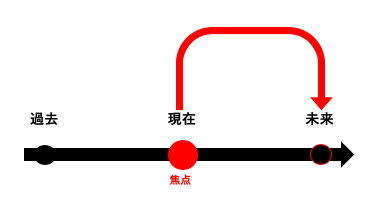Expression of the Future
Future actions can be expressed by adding the auxiliary verb will or [be verb + going + to]
(quasi auxiliary verb) to the left of the original form of the verb.
I will go shopping.
I will go shopping.
I am going to go shopping.
I am goint to go shopping.
I will go shopping.
[Difference between will and be going to]
will is a decision or intention (-I am going to do it) or an inference (-will be) at the time of the statement.
be going to indicates a schedule that was decided before the statement was made.
There is no actual grammatical matter of the future tense, in conversation,
the focus is on the present point in time, as in the following image,
and the future action is inferred from the present.

Small tidbit
. Many middle school English grammar books do not distinguish between will and be going to.be going to is also treated as one auxiliary verb with three words. (Pseudo(legal) auxiliary verb)
Short Notes
Go to Home Page